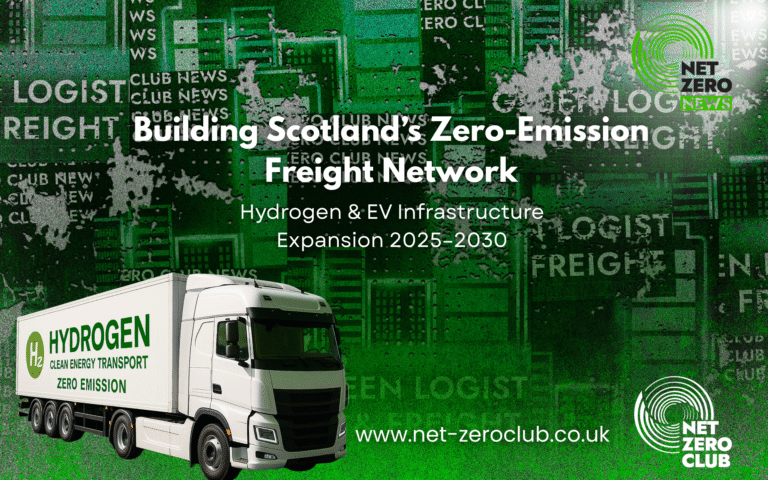Mercedes EV Trucks Power Net-Zero with Hydrogen Retrofit Funding

Welcome to Net Zero News, where we bring you the latest developments driving the UK’s transition to a net-zero future. Today we focus on a landmark initiative by Mercedes-Benz Trucks UK that underscores the readiness of electric heavy goods vehicles (HGVs) to transform long-haul transport across Britain.
In a significant step towards the UK’s net-zero goals, Net Zero News can reveal that Mercedes-Benz Trucks has begun large-scale deployment of its eActros 600 electric trucks at key logistics hubs in the Midlands and the North West. The project launched in October and involves over 100 vehicles operated by major hauliers, including national parcel carriers and food distributors, on routes up to 500 km daily.
Mercedes-Benz Trucks UK head of Future Sustainability James Venables explains that the eActros 600 combines a modular battery system with high-power charging capability to deliver up to 600 km of range on a single charge. The vehicles use intelligent energy management software to optimise battery usage according to load weight and topography. This initiative complements existing pilots of the eActros LongHaul demonstrator, which has logged over 50,000 km in real-world conditions.
Net Zero News understands this forms part of Daimler Truck AG’s global strategy to electrify all new model lines by 2030, in line with the UK’s national commitment to phase out diesel HGVs by 2040. The project also taps into regional decarbonisation targets set by the West Midlands Combined Authority, which aims to cut transport emissions by 50 percent by 2030.
This development matters because heavy goods transport accounts for nearly a quarter of the UK’s road emissions. Early commercial adoption of battery-electric trucks promises a material reduction in CO₂ output, noise pollution and local air quality impacts in urban centres. Analysts at the Energy Saving Trust estimate that full fleet conversion could save over 3 million tonnes of CO₂ annually by 2035.
Industry insiders anticipate additional benefits including lower total cost of ownership through reduced fuel and maintenance expenses. Drivers benefit from quieter cabins and instant torque, while depot operators can integrate renewable on-site power to charge vehicles, further cutting grid reliance. These outcomes echo the findings of our recent report on the Electric Buses Expansion in UK cities.
Funding for the eActros rollout comes from a blend of private investment by Daimler Truck AG and grants secured via the UK Infrastructure Bank’s £4 billion electric vehicle programme. Local enterprise partnerships in both the Midlands and Northwest invested in depot charging upgrades, while Innovate UK provided research grants for battery-management software development.
Key partners include Highways England, which is upgrading motorway service areas with 350 kW ultra-fast chargers, and the Advanced Propulsion Centre, which co-funded traction motor enhancements. Mercedes-Benz Trucks has also joined forces with National Grid to ensure sufficient distribution network capacity and has engaged local training colleges to deliver electric vehicle maintenance courses.
Net Zero News understands this truck electrification initiative aligns with the government’s Transport Decarbonisation Plan and the broader Industrial Decarbonisation Strategy. It supports the Department for Transport’s ambition to achieve net-zero emissions across all modes of transport by 2050 and reflects commitments under the ten-point Green Industrial Revolution programme.
At the regional level, the project sits alongside the Greater Manchester Hydrogen Refuelling Network, highlighted in our coverage of hydrogen infrastructure. By diversifying low-carbon technologies, authorities aim to de-risk the transition and drive innovation across supply chains.
Local communities stand to gain through improved air quality and reduced noise on major freight corridors. Logistics firms report positive employee feedback, noting that driver wellbeing improves when switching from diesel to electric. Meanwhile, suppliers in the UK-based battery and powertrain sector are scaling up production, sustaining skilled manufacturing jobs.
Challenges remain around vehicle range in colder weather and the standardisation of charging protocols. To address these issues, Mercedes-Benz Trucks is collaborating with the Zero Emission HGV Taskforce to develop best-practice guidelines and rolling out pilot swap-and-charge services at key depots.
Looking ahead, Mercedes-Benz Trucks plans to expand eActros operations to ports and cross-Channel routes by mid-2025, with further fleet orders expected later in the year. Net Zero News will continue to monitor this programme as it progresses through its next operational milestones.
Net Zero News is powered by the Net Zero Club (https://www.net-zeroclub.co.uk).
Join the UK’s fastest-growing net-zero community.
Upcoming Events:
– Net Zero Scotland Projects Conference (https://www.net-zero.scot/private-sector-register)
– Net Zero Nations Projects Conference (https://www.net-zeronations.co.uk/private-sector)
Got a net-zero project to share? Email: lee@net-zero.scot

 Got net-zero news, project updates, or product launches to share?
Got net-zero news, project updates, or product launches to share? 

